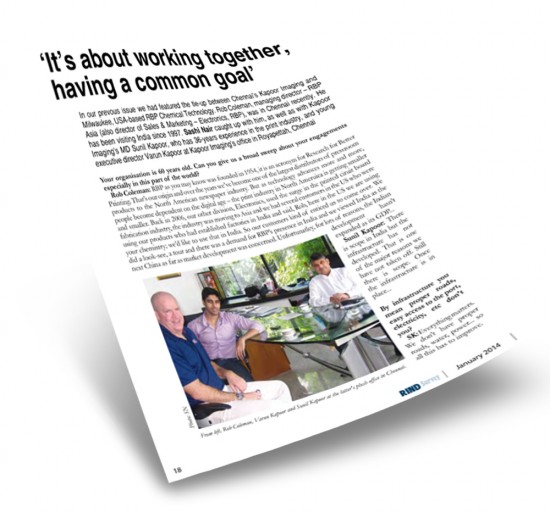News and Events
 RBP makes international headlines again:
RBP makes international headlines again:
Renowned journalist, Sashi Nair, publishes an insightful story in the January issue of RIND Survey.
![]() Cover Feature Story: DECEMBER 2013
Cover Feature Story: DECEMBER 2013
The Press Institute of India published a feature story about RBP Chemical Technology and its strategic license agreement with Kapoor Imaging in its December issue of RIND Survey.
Is there more to the average plate cleaner than meets the eye? Is there one plate cleaner that can act as a quick fix and solve press and plate cleaning needs? Why don’t plate cleaners work the same all the time? These are some of the questions that RBP technical service reps hear regularly. The following article will try to address them and help take the mystery out of choosing the proper plate cleaner for the job.
“Customer satisfaction is a flawed idea,” says Wayne Renken, CEO of SensArray Corp., in an issue of Electronic Business News. How can that be? Renken says that by focusing on “doing things right”, by improving the status quo, we may be blind to a novel and potentially more effective approach. To be truly valuable suppliers we should broaden our goal from customer satisfaction to a far more powerful concept — customer success.
On November 15 1990 President George Bush signed the Clean Air Act into law, legally restricting the output of selected air pollutants by cities and industry. The Act addresses multiple sources and types of air pollution, but for the purposes of this discussion, we will deal with the “VOC” [volatile organic compound] component of “ground level ozone”, resulting from the material choices and methods used in Printed Board fabrication. “Ground-level ozone (O3) is the major component of smog. Ozone is not emitted directly into the air, but is formed through complex chemical reactions between precursor emissions of volatile organic compounds (VOC) and nitrogen oxides (NOx) in the presence of sunlight.”
A simplified schematic of the reaction follows:
As anyone in the newspaper business knows, printing good quality color is tough. Poor ink density, background toning and a washed out appearance are all common problems. However, advertisers and consumers alike continue to demand more and more color, challenging newspapers to improve their quality while still containing costs.

NEWS ANNOUNCEMENT:
10/16/2013–RBP Chemical Technology, Milwaukee, Wisconsin, announced today an agreement with Kapoor Imaging Pvt Ltd to license the blending and distribution of its pressroom chemistries line in India. After a presence in India for more than six years, RBP recognized the need to partner with a locally-respected supplier to support its efforts in growing its business in the region and globally.
As summer warms up so does the pressroom – all too often pressmen experience an increase in growth and keeping the press/equipment clean can become more difficult. Fountain solutions contain biocides to control growth, but at times they are just not enough to keep the press at peak performance. Controlling biological growth and keeping the press mix clean can be accomplished by using UV light sources, ultrasonic methods, oxidizers such as bleach or peroxides, temperature, and biocides.

